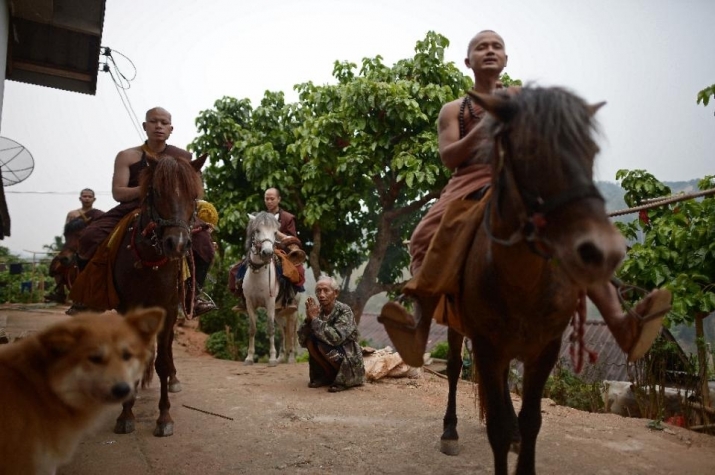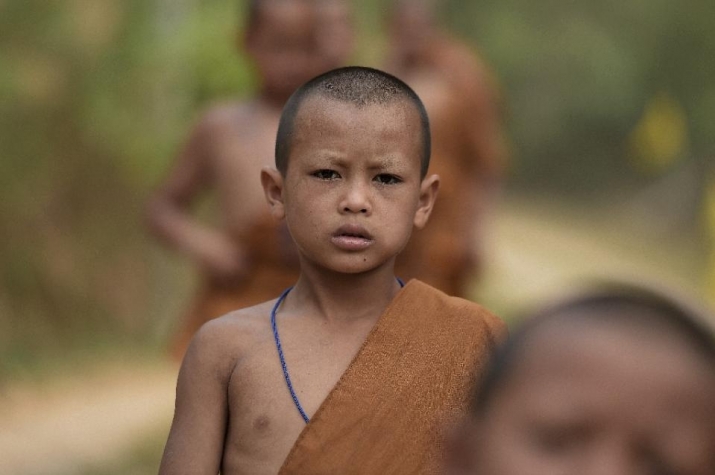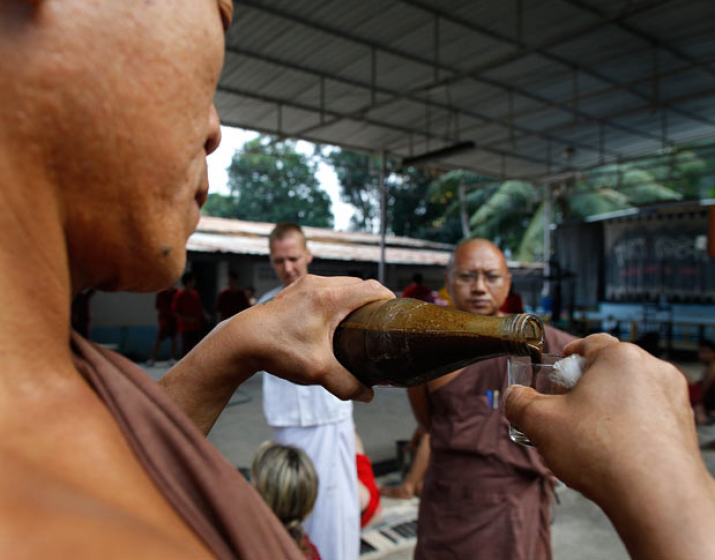NEWS
Buddhist Temples in Thailand Provide a Refuge for Drug Addiction Victims
 A resident makes an offering to horse-riding monks during their early morning alms round in the communities surrounding Golden Horse Temple in northern Thailand's Chiang Rai Province. From news.yahoo.com
A resident makes an offering to horse-riding monks during their early morning alms round in the communities surrounding Golden Horse Temple in northern Thailand's Chiang Rai Province. From news.yahoo.comWith addiction to substances, behaviors, and lifestyles a growing problem in societies all over the world, some Buddhist temples in Thailand are reaching out to local communities and even overseas in an attempt to provide an enabling environment that the victims of addiction—those abandoned by addicts and the substance abusers themselves—may be unable to find elsewhere.
Golden Horse Temple sits on a verdant mountainside in Thailand’s northernmost province of Chiang Rai. In the heart of the so-called Golden Triangle—an area comprising parts of northern Thailand, Myanmar, and Laos—decades of rampant drug trade have left an indelible mark on successive generations, and Buddhist monks at the temple are attempting to reach out to the youngest victims of the trade to provide the sort of social care that the government does not. Once infamous for its opium poppy fields, the main substance now manufactured and trafficked through the Golden Triangle—and the main source of addiction—is methamphetamine. The United Nations Office on Drugs and Crime estimates that more than 1.5 billion methamphetamine pills are manufactured in the region each year.
The majority of the novices at Golden Horse Temple are orphans or were abandoned by their drug-taking parents. “Hill tribe people have tough lives. It’s partly why they often take drugs and struggle to care for their kids,” said Phra Sutipong, the temple’s most senior monk. (China Daily)
 Buddhist novices outside Golden Horse Temple in northern Thailand. From news.yahoo.com
Buddhist novices outside Golden Horse Temple in northern Thailand. From news.yahoo.comThe novices, many of whom are suffering from malnutrition when they arrive, spend much of their time feeding and caring for the temple animals, especially the horses, and learning basic agriculture and cultivation, helping to work the vegetable gardens that feed the monastery. The monks say they aim to instill discipline in the lives of the novices and a sense of self-reliance by teaching them meditation, horse riding, and Muay Thai boxing.
“I barely had food to eat because my dad was a drug addict and didn’t work,” said 19-year-old Ponsakorn Mayer, one of the novices. “Without this temple, I wouldn’t have seen how vibrant life can be . . . my small village is full of drug problems.” (China Daily)
But Ponsakorn has also recognized the need to take what he has learned back to his home community. “At first I just wanted to stay here, but there are many problems in my home,” he said. “There are still not many alternative jobs. Most people sell and traffic drugs.” (China Daily)
Closer to Bangkok, Wat Thamkrabok in the central province of Saraburi provides a more spartan approach to combating substance addiction. Sometimes dubbed “the vomit temple,” Wat Thamkrabok was established in 1957 by the Buddhist nun Mian Parnchand (better known as Luang Por Yai) and her two nephews, although it is not officially recognized as a temple because it follows the teachings of Luang Por Yai, a woman.
Wat Thamkrabok began offering drug rehabilitation in 1959 and since then some 100,000 addicts have gone through the strict “cold turkey” detox program, which consists of Buddhist meditation, steam baths, manual work, and the consumption of a secret herbal detoxification compound that induces vomiting.
 A monk distributes a herbal detoxification brew to drug addicts before the vomiting session begins at Wat Thamkrabok in Saraburi Province, Thailand. From telegraph.co.uk
A monk distributes a herbal detoxification brew to drug addicts before the vomiting session begins at Wat Thamkrabok in Saraburi Province, Thailand. From telegraph.co.uk“Invariably, the people who end up here come as a last resort,” said Phra Hans, a Swiss psychologist who became a Buddhist monk after visiting Thamkrabok seven years ago. (Reuters) He said the herbal compound helped to draw toxins out of the body and into the stomach, from where the quickest way to expel them is for the patient to drink large quantities of water and then vomit.
Patients at the temple, 80 per cent of whom are Thai Buddhists and the rest foreigners, must agree to remain for a minimum treatment period of 10 days, and all are required to accept a Buddhist vow never to touch drugs or alcohol again.
Adam, from London, turned to Wat Thamkrabok after 17 years of heroin and crack addiction. “Every time I get that little voice in my head and think I’m getting into trouble, I just close my eyes and say the words in Thai, and I’m OK,” he said. “My mind used to race at 1,000 mph and I couldn’t slow down. I couldn’t work, couldn’t read books. But then I tried the meditation and felt really calm.” (Reuters)
See more
Thai temple fights addiction with horses and boxing (China Daily)
Drug addicts vomit out their ills in Thai monastery (Reuters)
Detox monastery: drug addicts go into rehab at Thamkrabok monastery in Saraburi, Thailand (The Telegraph)
Thamkrabok Independent Information Network














